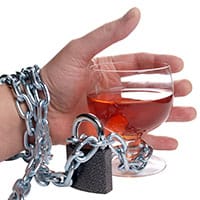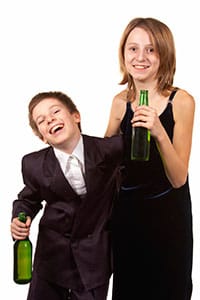The consumption of alcohol has become something of a rite of passage for young men and women looking to make the transition into adulthood. Under the mistaken impression that drinking equates with maturity, adolescents frequently begin experimenting with alcohol in peer group settings, where violating taboos is often encouraged and supported. Teenage alcohol consumption has been declining over the last two decades. Nevertheless, drinking is still common among this age group; two out of every three high school-age youth in the United States have tried alcohol at some point, while one-third drink regularly and one out of five routinely binge drink. Statistics like these tend to leave parents feeling helpless, because the forces pushing their kids toward drinking seem impossible to resist. Some become so discouraged that they actually decide to allow their adolescent children to drink at home, believing that this is the only way they have to monitor and moderate their kids’ behavior. But there is no reason to throw up the white flag before the barbarians have even arrived at the gate. Teaching young people how to think for themselves, resist peer pressure, and make intelligent decisions about how to live their lives is not always easy, but it is far from impossible, and parents who are determined to do so can influence their kids’ choices with respect to alcohol. But the key to making it happen is to start early, and to proceed with an intelligent plan that includes the crucial elements that are likely to make a difference.
Promoting Cultural Awareness
As connoisseurs of electronic information and entertainment, we are all bombarded daily with messages both subtle and direct that make a connection between alcohol consumption and happiness, success, and personal fulfillment. We may occasionally be presented with cautionary tales about the evils of alcoholism or drunk driving, but for the most part our cultural associations with respect to alcohol are positive, making it seem as if drinking is entirely normal and harmless and an indispensable part of a satisfying adult lifestyle. Rather than letting this subliminal campaign to condition young people to see alcohol consumption as benign and essential to the good life go unchallenged, parents should take it upon themselves to open up a discussion with their children about the way alcohol is portrayed in the mass media (i.e., in commercials, movies, TV shows, videos, print or online ads, etc.). Moms and dads should solicit their kids’ thoughts and opinions about what is being presented: about how realistic it is, about the kinds of hidden meanings that are contained in alcohol-themed advertising, and about the possible real-life consequences someone might face if he or she followed the example of a particular character consuming alcohol in a fictional setting. None of this should be done in a heavy-handed or moralistic way. The idea is to simply start the conversation and to keep it going, thereby opening the door for even more serious discussion about this and other issues in the future. Parents who treat their adolescent children with respect when talking about alcohol and who don’t give in to the temptation to lecture and moralize are usually very pleased with the response they receive, as their sons and daughters are generally eager to offer their thoughts and insights on an important subject.
Understanding the Social Context
The strongest risk factor for your teen to start drinking is having a best friend who drinks, which shows that it is not so much peer pressure in general that makes an impact as it is peer influence in the group in which a particular adolescent travels. In recognition of this reality, parents should always make an effort to get to become familiar with friends their kids are spending time with, and to speak to the parents of those young people if there are opportunities to do so. By establishing friendly relations with those who are in their son or daughter’s social circle, it may be possible for parents individually or collectively to organize fun group outings that will help keep all of the kids moving in a positive direction, decreasing the chances they will start experimenting with alcohol because they are bored or have been left segregated on their own little peer group island where negative behavior is easily reinforced. Generally speaking, the more involved in an adolescent’s life a parent becomes—getting to know friends, attending games, concerts, or plays in which a son or daughter is performing, faithfully visiting with teachers during conferences, providing the kids with opportunities to learn new skills or practice fun hobbies outside the school setting, etc.—the less likely it is that the child will end up getting into trouble. Attention from parents really does matter to children at all ages, no matter how frequently they may proclaim their independence once they enter their teenage years. The second biggest risk factor for underage drinking is coming from a family that has a history of alcoholism or binge drinking. Kids certainly do model other kids, but they also model their parents, and whether they want to admit it or not, parents who drink to excess are setting a bad example for their sons and daughters. ‘Do as I say and not as I do’ is boldly imprinted on the hypocrite’s calling card, and any parent who thinks that kids can be kept away from alcohol by a few discouraging words when it is being misused and abused in their very own homes is indulging in wishful thinking. If, on the other hand, parents who struggle with alcohol make a concerted effort to clean up their act, the kids will notice the difference and they may come to see alcohol as an enemy to be avoided.
Honesty and Respect are Priceless Virtues
It has often been said that honesty is the best policy, and this is most definitely true when it comes time to talk to our kids about the real dangers of alcohol. Someone speaking the truth in a straightforward manner about this topic will not require a lecture, a sermon, or a 25-slide PowerPoint presentation to get the message across, and if adolescents are approached openly and non-judgmentally on the subject of alcohol and invited to join in an ongoing dialogue, they will almost always react favorably. The greatest obstacles for parents who hope to gently persuade their kids to at least make intelligent decisions about alcohol if not avoid it altogether are procrastination and defeatism. If a proactive and upbeat approach is adopted, there is every reason to believe that adolescents will listen to what their parents have to say about alcohol and take the words they hear very seriously. If we treat our kids with respect, they will be respectful of us in return, and when an atmosphere of mutual respect has been established, good things are likely to follow.




